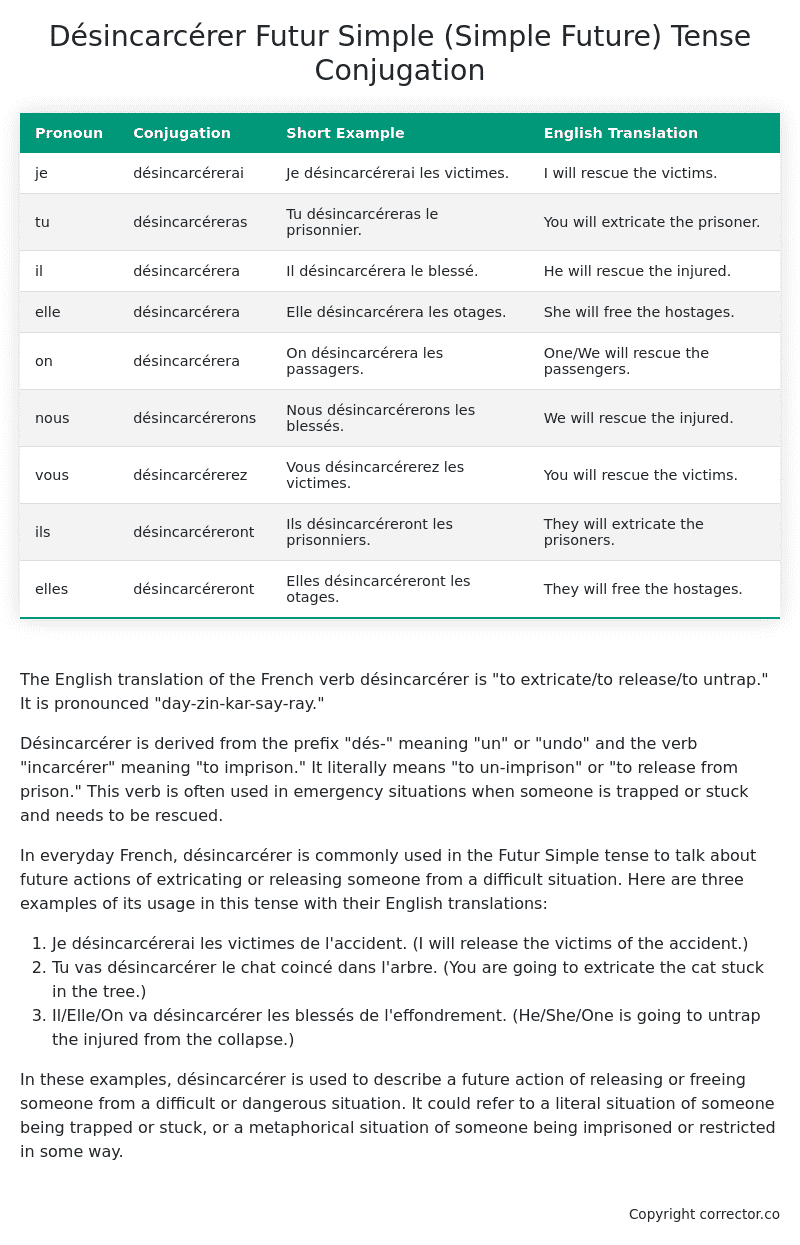Futur Simple (Simple Future) Tense Conjugation of the French Verb désincarcérer
Introduction to the verb désincarcérer
The English translation of the French verb désincarcérer is “to extricate/to release/to untrap.” It is pronounced “day-zin-kar-say-ray.”
Désincarcérer is derived from the prefix “dés-” meaning “un” or “undo” and the verb “incarcérer” meaning “to imprison.” It literally means “to un-imprison” or “to release from prison.” This verb is often used in emergency situations when someone is trapped or stuck and needs to be rescued.
In everyday French, désincarcérer is commonly used in the Futur Simple tense to talk about future actions of extricating or releasing someone from a difficult situation. Here are three examples of its usage in this tense with their English translations:
- Je désincarcérerai les victimes de l’accident. (I will release the victims of the accident.)
- Tu vas désincarcérer le chat coincé dans l’arbre. (You are going to extricate the cat stuck in the tree.)
- Il/Elle/On va désincarcérer les blessés de l’effondrement. (He/She/One is going to untrap the injured from the collapse.)
In these examples, désincarcérer is used to describe a future action of releasing or freeing someone from a difficult or dangerous situation. It could refer to a literal situation of someone being trapped or stuck, or a metaphorical situation of someone being imprisoned or restricted in some way.
Table of the Futur Simple (Simple Future) Tense Conjugation of désincarcérer
| Pronoun | Conjugation | Short Example | English Translation |
|---|---|---|---|
| je | désincarcérerai | Je désincarcérerai les victimes. | I will rescue the victims. |
| tu | désincarcéreras | Tu désincarcéreras le prisonnier. | You will extricate the prisoner. |
| il | désincarcérera | Il désincarcérera le blessé. | He will rescue the injured. |
| elle | désincarcérera | Elle désincarcérera les otages. | She will free the hostages. |
| on | désincarcérera | On désincarcérera les passagers. | One/We will rescue the passengers. |
| nous | désincarcérerons | Nous désincarcérerons les blessés. | We will rescue the injured. |
| vous | désincarcérerez | Vous désincarcérerez les victimes. | You will rescue the victims. |
| ils | désincarcéreront | Ils désincarcéreront les prisonniers. | They will extricate the prisoners. |
| elles | désincarcéreront | Elles désincarcéreront les otages. | They will free the hostages. |
Other Conjugations for Désincarcérer.
Le Present (Present Tense) Conjugation of the French Verb désincarcérer
Imparfait (Imperfect) Tense Conjugation of the French Verb désincarcérer
Passé Simple (Simple Past) Tense Conjugation of the French Verb désincarcérer
Passé Composé (Present Perfect) Tense Conjugation of the French Verb désincarcérer
Futur Simple (Simple Future) Tense Conjugation of the French Verb désincarcérer (this article)
Futur Proche (Near Future) Tense Conjugation of the French Verb désincarcérer
Plus-que-parfait (Pluperfect) Tense Conjugation of the French Verb désincarcérer
Passé Antérieur (Past Anterior) Tense Conjugation of the French Verb désincarcérer
Futur Antérieur (Future Anterior) Tense Conjugation of the French Verb désincarcérer
Subjonctif Présent (Subjunctive Present) Tense Conjugation of the French Verb désincarcérer
Subjonctif Passé (Subjunctive Past) Tense Conjugation of the French Verb désincarcérer
Subjonctif Imparfait (Subjunctive Imperfect) Tense Conjugation of the French Verb désincarcérer
Conditionnel Présent (Conditional Present) Tense Conjugation of the French Verb désincarcérer
Conditionnel Passé (Conditional Past) Tense Conjugation of the French Verb désincarcérer
L’impératif Présent (Imperative Present) Tense Conjugation of the French Verb désincarcérer
L’infinitif Présent (Infinitive Present) Tense Conjugation of the French Verb désincarcérer
Struggling with French verbs or the language in general? Why not use our free French Grammar Checker – no registration required!
Get a FREE Download Study Sheet of this Conjugation 🔥
Simply right click the image below, click “save image” and get your free reference for the désincarcérer Futur Simple tense conjugation!

Désincarcérer – About the French Futur Simple (Simple Future) Tense
Formation of Futur Simple
For regular -er verbs (e.g., parler – to speak)
For regular -ir verbs (e.g., finir – to finish)
For regular -re verbs (e.g., vendre – to sell)
Common Everyday Usage Patterns
Conditional Statements
Interactions with Other Tenses
Futur Antérieur
Conditional
Present
Summary
I hope you enjoyed this article on the verb désincarcérer. Still in a learning mood? Check out another TOTALLY random French verb conjugation!


